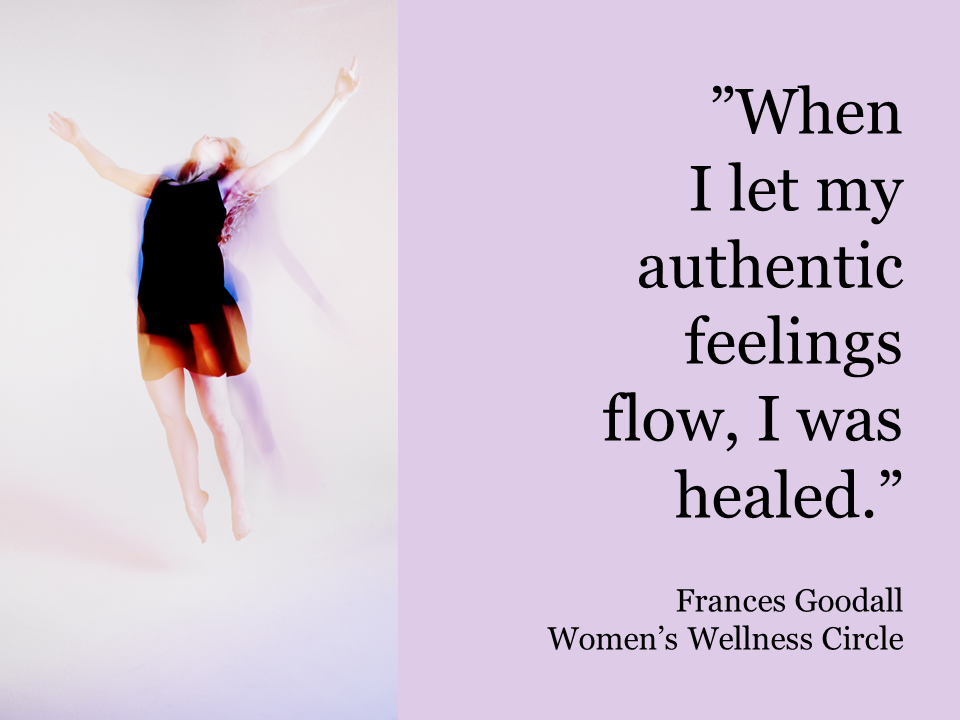Many persons who have finally healed from a chronic health condition (such as chronic pain, fatigue, PTSD, or cancer) emphasize certain conditions that have been essential to their healing. These conditions can be summarized as: authenticity, joy, freedom, self-empowerment, optimism, and social support.
Frances Goodall, co-founder of the Women’s Wellness Circle in the UK, describes her own healing journey from Chronic Fatigue Syndrome at the online summit Women’s Wellnes Council 2019. Her full healing finally happened when she “let her authentic feelings flow”, as she explained. Not only did she let her negative emotions flow, but also she began listening to and fully expressing her positive feelings, including her joy. Authenticity, Freedom and Joy were thus key factors enabling her to eventually heal.
To summarize, six key factors have shown to be essential for enabling natural healing, regardless of which condition that we are facing. These are:
- AUTHENTICITY (being true to our selves): In order to heal from an illness or any chronic health condition, we need to start listening to our Inner Self (our Soul) and the truths it conveys. As we listen more deeply within, we will become aware of our deeper needs, desires and longings, as well as what we lack in our present life and what drains us of energy. Also, we need to give ourselves permission to take these insights and truths seriously, and to begin to act upon them in our daily life. Ultimately, we need to create a life where we are following our inner guidance and living in alignment with our truth, no matter how inconvenient and uncomfortable our truths may be.
- FREEDOM (expressing our feelings freely): For our healing, we also need to express ourselves freely. This includes expressing all of our feelings. Our natural ways of self-expression are unique to us. Perhaps we need to get to know them again as adults, and then to accept them as they are. Some people express themselves in large, loud and bold ways, while others prefer to be more subtle, calm and cautious. We cannot violate our personality; ultimately we need to surrender to our natural ways (although we might need to compromise with the needs of others sometimes). Our emotions are in fact made of subtle energy. This energy needs to flow freely both within our body and outwardly. Many people have learned (over time) to hold their feelings back and to put a lid on their anger, sadness, grief, etc, as well as their joy, gratitude, and love. We often block ourselves unconsciously as not to overwhelm and cause unease to others. Over time, as we hold our emotions back, we are creating built-up energy in our bodies. Eventually, this may result in tension and muscle fatigue, even chronic pain or a disease. Eventually, we must learn to relax and start releasing this blocked energy so that we can create space for new healthy energy to flow through us, in order to heal our body.
- JOY (following our heart’s desire): When we follow our heart’s true desire, we feel a spontaneous joy and natural force of life inside. When this joyous energy is allowed to flow freely throughout our body, without constraints, we are replenishing, rejuvenating and healing our body in miraculous ways. We are in fact tapping into an endless reservoar of universal life energy, which springs up from within and flows through every cell of our body. In contrast, when we take action mainly out of necessity, plight or self-discipline, the energy is largely sourced from our muscle tissues and other organs. Also, as we force ourselves to do things against our own will, we tense our bodies unconsciously. As a result, our body can become depleted of energy, our muscles sore and aching, and our overall health can eventualy be compromised. Therefore, an essential ingredient for healing is to listen to our heart and follow our true joy.
- SELF-EMPOWERMENT (influencing our life): To be able to influence and improve our life circumstances, no matter how small the improvement might be, can be greatly empowering. Experiencing an improvement can give us renewed hope, strength and energy. At the most fundamental level, we at least have the power to influence our own thinking, which in turn influences our feelings and ultimately our reactions and actions. With our free will, we can also make new choices that will shift our situation for the better. Even when we feel largely stuck in a seemingly hopeless situation, we can choose to look for inspiration and hope in a true positive story about someone else who was able to heal from a similar condition as we have. Moreover, we can find new ways to manage our situation through alternative creative approaches (such as sound baths, breathing, journaling, drawing, smoothies, etc.). With small steps in the right direction, we are likely to see light at the end of the tunnel eventually. When we begin to take actions to improve our situation (even if just a tiny bit), we will stop feeling like a complete victim. If we widen our perspective, we also broaden our horizon. In essence, there is always something that we can do to shift our experience and improve our life. Every little step on the way counts to restoring our health and wellbeing.
- OPTIMISM (looking for the positive): Ultimately, we need to believe in the possibility of our recovery, or at least believe in the higher good of our situation from a soul perspective. Mary Morrissey suggests that we ask ourselves: “What good can possibly come out of this?”. This question can be deeply transformational as it opens up a completely new outlook on our situation. We are here encouraged to look for any benefit or gain that can arise from our situation (in the present moment or forseeable future). Any gain or benefit can be found, regardless of how dark or hopeless it may seem in the now. Here, having some kind of spiritual belief system (i.e. a belief in a universal benevolent Higher Power), by which to put our trust in, has proven very helpful.
- Social support (receiving support from others): Lastly, we do depend on the support of others, especially when we are facing great challenges or when our health is wavering. In these moments, we are greatly supported by having someone to talk to, ideally someone who will listen to our sadness or worries and also encourage us and lift us up. We truly benefit from someone who believes in our recovery and future health, even it may seem very distant to us (even impossible) in the present moment. Other people may lighten our work load around the home, or give a smile and hug when we feel low. Having a support team of persons with different roles can be THE difference that makes the journey so much easier.




